
NGC 6217 is a barred spiral galaxy located some 67 million light years away, in the constellation Ursa Minor. It can be located with a 10 cm (4 in) or larger telescope as an 11th magnitude object about 2.5° east-northeast of the star Zeta Ursae Minoris. The galaxy is inclined by an angle of 33° to the line of sight along a position angle of 162°.

NGC 51 is a lenticular galaxy in the constellation Andromeda. It has a diameter of 90,000 light-years. The galaxy was discovered on September 7, 1885 by Lewis Swift, who described it as "Pretty faint, pretty small, round, brighter middle."

NGC 425 is a spiral galaxy in the constellation of Andromeda. It was discovered on 29 October 1866 by Truman Safford.

NGC 426 is an elliptical galaxy that is also classified as a Seyfert galaxy. It is located in the constellation of Cetus, and it was discovered on December 20, 1786, by William Herschel.
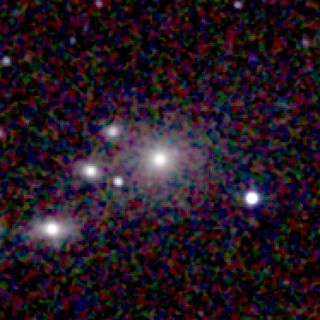
NGC 7012 is a large, bright elliptical galaxy located about 380 million light-years away from Earth in the constellation Microscopium. NGC 7012 was discovered by astronomer John Herschel on July 1, 1834.
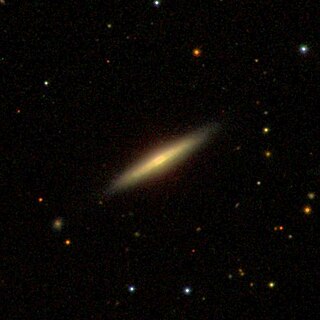
NGC 489 is probably an edge-on spiral galaxy located about 97 million Light-years away from Earth in the constellation Pisces. NGC 489's calculated velocity is 2507 km/s. NGC 489 was discovered by German astronomer Heinrich Louis d'Arrest on December 22, 1862.

NGC 7083 is an unbarred spiral galaxy located about 134 million light-years away in the constellation of Indus. It is also classified as a flocculent spiral galaxy. NGC 7083 was discovered by astronomer James Dunlop on August 28, 1826.

NGC 4483 is a barred lenticular galaxy located about 55 million light-years away in the constellation of Virgo. NGC 4483 was discovered by astronomer Heinrich d'Arrest on March 19, 1865. NGC 4483 is a member of the Virgo Cluster.
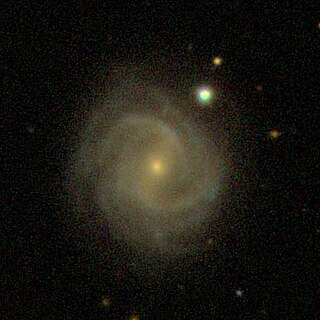
NGC 2503 is an isolated spiral galaxy approximately 254 million light-years away in the constellation Cancer. The galaxy was discovered on February 17, 1865 by astronomer Albert Marth.
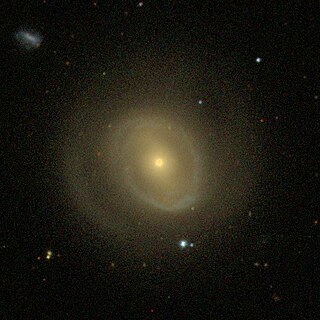
NGC 4454 is a barred spiral galaxy located about 123 million light-years away in the constellation of Virgo. NGC 4454 was discovered by astronomer William Herschel on April 17, 1784.

NGC 4466 is an edge-on spiral galaxy located about 50 million light-years away in the constellation of Virgo. NGC 4466 was discovered by astronomer Bindon Stoney on February 26, 1851. The galaxy is a member of the Virgo Cluster.

NGC 4429 is a lenticular galaxy located about 55 million light-years away in the constellation of Virgo. NGC 4429 is tilted at an inclination of about 75° which means that the galaxy is tilted almost edge-on as seen from Earth. NGC 4429 was discovered by astronomer William Herschel on March 15, 1784. The galaxy is a member of the Virgo Cluster.

NGC 4754 is a barred lenticular galaxy located about 53 million light-years away in the constellation of Virgo. NGC 4754 was discovered by astronomer William Herschel on March 15, 1784. It forms a non-interacting pair with the edge-on lenticular galaxy NGC 4762. NGC 4754 is a member of the Virgo Cluster.
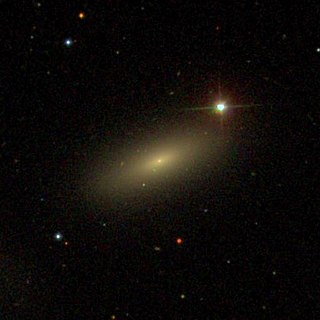
NGC 4436 is a lenticular or dwarf elliptical galaxy located about 60 million light-years away in the constellation of Virgo. NGC 4436 was discovered by astronomer William Herschel on April 17, 1784. The galaxy is a member of the Virgo Cluster.

NGC 4482 is a dwarf elliptical galaxy located about 60 million light-years away in the constellation Virgo. NGC 4482 was discovered by astronomer William Herschel on March 15, 1784. It was rediscovered by astronomer Arnold Schwassmann on September 6, 1900 and was listed as IC 3427. It is a member of the Virgo Cluster.

NGC 4491 is a dwarf barred spiral galaxy located about 55 million light-years away in the constellation Virgo. NGC 4491 was discovered by astronomer William Herschel on March 15, 1784. NGC 4491 is located in a subgroup of the Virgo Cluster centered on Messier 87 known as the Virgo A subgroup.

NGC 495, also occasionally referred to as PGC 5037, UGC 920 or GC 278, is a barred spiral galaxy in the constellation Pisces. It is located approximately 184 million light-years from the Solar System and was discovered on 12 September 1784 by astronomer William Herschel.

NGC 498 is a lenticular galaxy located about 260 million light-years away from Earth, in the constellation Pisces. NGC 498 was discovered by astronomer R. J. Mitchell on October 23, 1856.

NGC 4871 is a lenticular galaxy located about 310 million light-years away in the constellation of Coma Berenices. NGC 4871 was discovered by astronomer Heinrich d'Arrest on May 10, 1863. It is a member of the Coma Cluster.

NGC 4883 is a barred lenticular galaxy located about 315 million light-years away in the constellation Coma Berenices. NGC 4883 was discovered by astronomer Heinrich d'Arrest on April 22, 1865. It is a member of the Coma Cluster.























